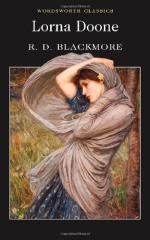|
This section contains 713 words (approx. 3 pages at 300 words per page) |

|
Unlike novelists such as Gustave Flaubert or Henry James, who exercised complete control over the materials that went into their fiction, Blackmore let his books develop as he wrote them. As a result, most of his novels, including Lorna Doone, are loosely structured.
Endings in particular proved difficult for him, and he freely admitted to his friends that knowing when to stop writing was a lifelong problem. In this manner he resembled the equally longwinded American writer Thomas Wolfe, but Wolfe had expert editorial assistance to help curb his excesses. Editors in the mid-Victorian period were more tolerant of what now would be considered unnecessarily long novels, and the three-volume novel was a standard length. Most reputable critics during the 1860s believed that novels should not leave their readers depressed, and Blackmore's own optimistic nature helped determine that his heroes and heroines met with happy endings...
|
This section contains 713 words (approx. 3 pages at 300 words per page) |

|




